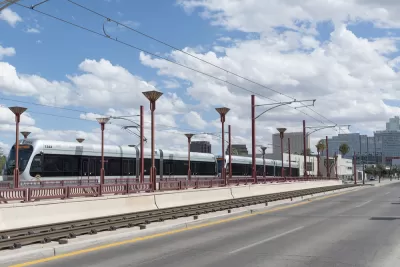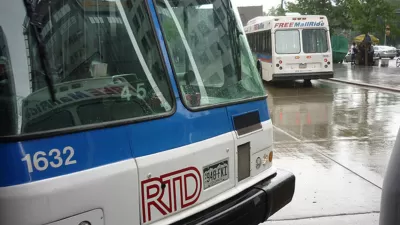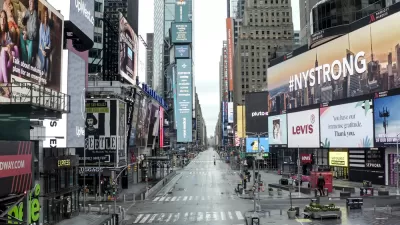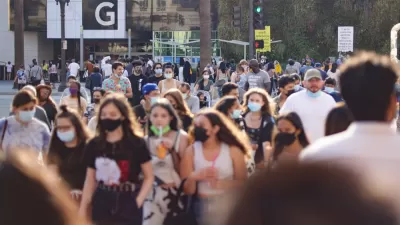Construction continues on three Phoenix light rail projects set to be completed in 2024.

With light rail ridership down 50 percent since the onset of the coronavirus pandemic, Phoenix's Valley Metro is taking advantage of reduced traffic congestion to continue, and in some cases, accelerate the construction of a new downtown transfer hub and light rail extensions.
"Valley Metro spokesperson Hillary Foose said both the light rail and bus system serve an 'essential group of riders' — people like health care workers, grocery store clerks and janitorial workers, who continued to go into work while others stayed home," reports Jessica Boehm.
According to Foose, Phoenix has fared better than other U.S. cities—light rail service has been reduced from every 12 minutes to every 15 minutes and only some bus lines have reduced service capacity.
Phoenix Mayor Kate Gallego predicts that ridership will ramp up once schools resume in-person classes and workers return to traditional office spaces. Boehm reports that about a third of transit riders are student commuters.
The projects under construction include a new downtown light rail hub that will "allow riders to transfer between the existing light rail line and the line that eventually will head down Central Avenue into south Phoenix," writes Boehm.
A South Central light rail extension will reduce vehicle lanes from four lanes to two lanes between Central Avenue to Baseline Road. Additionally, the Metrocenter rail line will be extended a mile and a half to the Metrocenter Mall that closed in June. "Gallego said she's confident Metrocenter will be bought by a developer who will invest in the property and bring it into the 21st century," Boehm notes.
All three projects are on track to open to passengers in 2024.
FULL STORY: Phoenix light rail expansion plans on track despite COVID-19 declining ridership

Maui's Vacation Rental Debate Turns Ugly
Verbal attacks, misinformation campaigns and fistfights plague a high-stakes debate to convert thousands of vacation rentals into long-term housing.

Planetizen Federal Action Tracker
A weekly monitor of how Trump’s orders and actions are impacting planners and planning in America.

In Urban Planning, AI Prompting Could be the New Design Thinking
Creativity has long been key to great urban design. What if we see AI as our new creative partner?

King County Supportive Housing Program Offers Hope for Unhoused Residents
The county is taking a ‘Housing First’ approach that prioritizes getting people into housing, then offering wraparound supportive services.

Researchers Use AI to Get Clearer Picture of US Housing
Analysts are using artificial intelligence to supercharge their research by allowing them to comb through data faster. Though these AI tools can be error prone, they save time and housing researchers are optimistic about the future.

Making Shared Micromobility More Inclusive
Cities and shared mobility system operators can do more to include people with disabilities in planning and operations, per a new report.
Urban Design for Planners 1: Software Tools
This six-course series explores essential urban design concepts using open source software and equips planners with the tools they need to participate fully in the urban design process.
Planning for Universal Design
Learn the tools for implementing Universal Design in planning regulations.
planning NEXT
Appalachian Highlands Housing Partners
Mpact (founded as Rail~Volution)
City of Camden Redevelopment Agency
City of Astoria
City of Portland
City of Laramie





























